新译林版七年级(上册)英语全册知识点归纳总结
(完整版)新译林版七年级上册英语全册知识点归纳总结
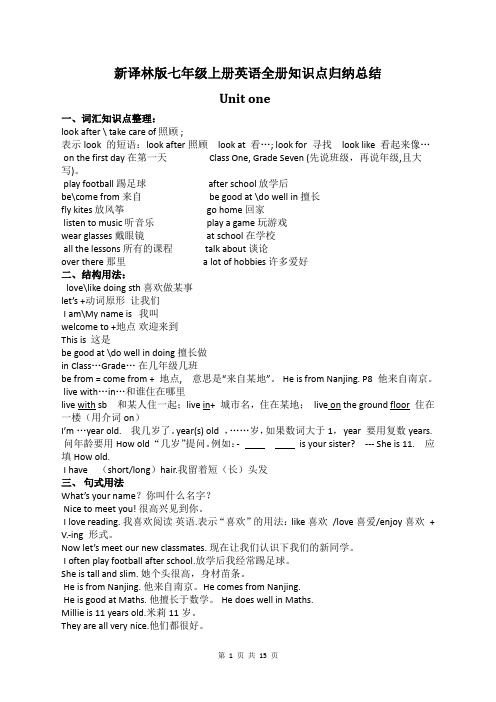
新译林版七年级上册英语全册知识点归纳总结Unit one一、词汇知识点整理:look after \ take care of 照顾 ;表示look 的短语:look after照顾look at 看…; look for 寻找look like 看起来像… on the first day 在第一天Class One, Grade Seven (先说班级,再说年级,且大写)。
play football 踢足球 after school 放学后be\come from 来自be good at \do well in 擅长fly kites 放风筝go home 回家listen to music 听音乐play a game 玩游戏wear glasses 戴眼镜at school 在学校all the lessons 所有的课程 talk about 谈论over there 那里 a lot of hobbies 许多爱好二、结构用法:love\like doing sth 喜欢做某事let’s +动词原形让我们I am\My name is 我叫welcome to +地点欢迎来到This is 这是be good at \do well in doing 擅长做in Class…Grade…在几年级几班be from = come from + 地点, 意思是“来自某地”。
He is from Nanjing. P8 他来自南京。
live with…in…和谁住在哪里live with sb 和某人住一起;live in+ 城市名,住在某地;live on the ground floor 住在一楼(用介词on)I’m…year old. 我几岁了。
year(s) old ,……岁,如果数词大于1,year 要用复数years. 问年龄要用How old “几岁”提问。
例如:- is your sister? --- She is 11. 应填How old.I have (short/long)hair.我留着短(长)头发三、句式用法What’s your name?你叫什么名字?Nice to meet you! 很高兴见到你。
(完整版)新译林版七年级上册英语全册知识点归纳总结
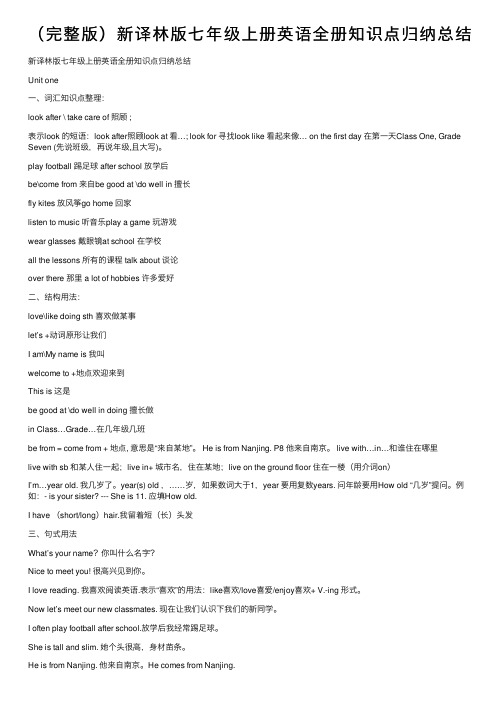
(完整版)新译林版七年级上册英语全册知识点归纳总结新译林版七年级上册英语全册知识点归纳总结Unit one⼀、词汇知识点整理:look after \ take care of 照顾 ;表⽰look 的短语:look after照顾look at 看…; look for 寻找look like 看起来像… on the first day 在第⼀天Class One, Grade Seven (先说班级,再说年级,且⼤写)。
play football 踢⾜球 after school 放学后be\come from 来⾃be good at \do well in 擅长fly kites 放风筝go home 回家listen to music 听⾳乐play a game 玩游戏wear glasses 戴眼镜at school 在学校all the lessons 所有的课程 talk about 谈论over there 那⾥ a lot of hobbies 许多爱好⼆、结构⽤法:love\like doing sth 喜欢做某事let’s +动词原形让我们I am\My name is 我叫welcome to +地点欢迎来到This is 这是be good at \do well in doing 擅长做in Class…Grade…在⼏年级⼏班be from = come from + 地点, 意思是“来⾃某地”。
He is from Nanjing. P8 他来⾃南京。
live with…in…和谁住在哪⾥live with sb 和某⼈住⼀起;live in+ 城市名,住在某地;live on the ground floor 住在⼀楼(⽤介词on)I’m…year old. 我⼏岁了。
year(s) old ,……岁,如果数词⼤于1,year 要⽤复数years. 问年龄要⽤How old “⼏岁”提问。
牛津译林版英语七年级上册分单元知识点归纳总结(Unit1-8))

牛津译林版英语七年级上册全册知识点归纳总结(最新)Unit one一、词汇知识点整理:look after \ take care of 照顾;表示look 的短语:look after照顾look at 看…;look for 寻找look like 看起来像…on the first day 在第一天Class One, Grade Seven (先说班级,再说年级,且大写)。
play football 踢足球after school 放学后be\come from 来自be good at \do well in 擅长fly kites 放风筝go home 回家listen to music 听音乐play a game 玩游戏wear glasses 戴眼镜at school 在学校all the lessons 所有的课程talk about 谈论over there 那里 a lot of hobbies 许多爱好二、结构用法:love\like doing sth 喜欢做某事let’s +动词原形让我们I am\My name is 我叫welcome to +地点欢迎来到This is 这是be good at \do well in doing 擅长做in Class…Grade…在几年级几班be from = come from + 地点, 意思是“来自某地”。
He is from Nanjing. P8 他来自南京。
live with…in…和谁住在哪里live with sb 和某人住一起;live in+ 城市名,住在某地;live on the ground floor 住在一楼(用介词on)I’m …year old. 我几岁了。
year(s) old ,……岁,如果数词大于1,year 要用复数years. 问年龄要用How old “几岁”提问。
例如:- is your sister? --- She is 11. 应填How old.I have (short/long)hair.我留着短(长)头发三、句式用法What’s your name?你叫什么名字?Nice to meet you! 很高兴见到你。
七年级上册英语译林版知识点
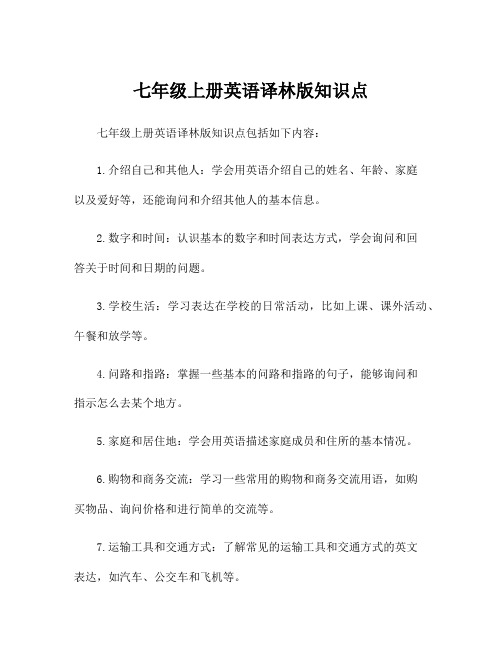
七年级上册英语译林版知识点
七年级上册英语译林版知识点包括如下内容:
1.介绍自己和其他人:学会用英语介绍自己的姓名、年龄、家庭
以及爱好等,还能询问和介绍其他人的基本信息。
2.数字和时间:认识基本的数字和时间表达方式,学会询问和回
答关于时间和日期的问题。
3.学校生活:学习表达在学校的日常活动,比如上课、课外活动、午餐和放学等。
4.问路和指路:掌握一些基本的问路和指路的句子,能够询问和
指示怎么去某个地方。
5.家庭和居住地:学会用英语描述家庭成员和住所的基本情况。
6.购物和商务交流:学习一些常用的购物和商务交流用语,如购
买物品、询问价格和进行简单的交流等。
7.运输工具和交通方式:了解常见的运输工具和交通方式的英文
表达,如汽车、公交车和飞机等。
8.美食和饮食文化:学习一些常见的食物和饮食文化的英语表达,如点菜、询问口味和介绍菜单等。
9.谈论天气和季节:学会用英语询问和讨论天气和季节的情况,
如天气如何、喜欢哪个季节等。
10.个人喜好和爱好:学会用英语表达个人的喜好和爱好,包括喜
欢的颜色、动物、运动和音乐等。
以上是七年级上册英语译林版的一些主要知识点,希望能对你有
所帮助。
新译林版英语七年级(初一)上册Unit 4知识点归纳总结

Thanks for your email. 1. 谢谢你的电子邮件。 2. 我想告诉你我在这里的生活。 I would like to tell you about my life here. 3. 他们多久锻炼一次。 --- How often do they exercise? 他经常在操场踢足球。 --- He usually plays football in the playground. 4. 她多久去上一次舞蹈课? --- How often does she go to her dancing lessons. 她一个星期去上舞蹈课一次/两次。 --- She goes to her dancing lessons once/twice a week.
15. … 迟到 be late for
16. 开始上课 start lessons
17. 在8点15分 at a quarter past eight 18. 在7点45分 at a quarter to eight 19. 在7点半 at half past seven
Reading短语:
1. 从星期一到星期五 from Monday to Friday 2. 擅长做某事 be good at doing sth a lot of= lots of +可数名词/不可数名词 3.许多 many + 可数名词复数 much +不可数名词 许多 4. 对某人友好 be nice/kind/friendly to sb 5. 和某人聊天 chat→chatting chat with sb 6. 相互 each other 7. 或者;否则 or in the playground 8. 在操场
Grammar短语:
新译林七年级上册英语全册知识点归纳总结
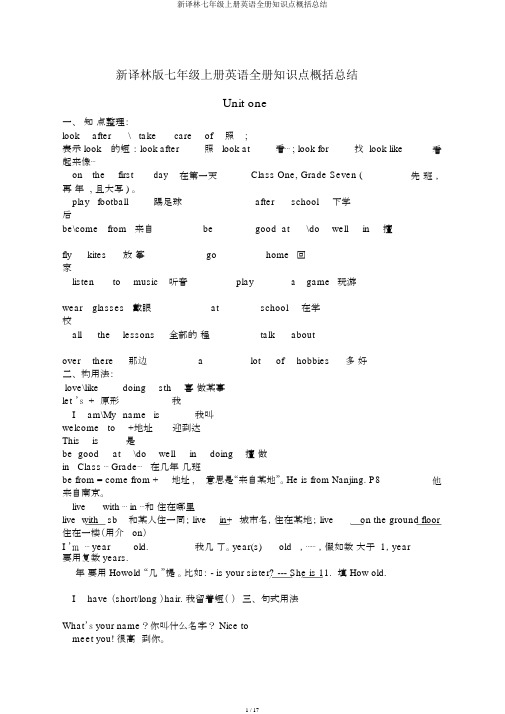
新译林版七年级上册英语全册知识点概括总结Unit one一、知点整理:look after\ take care of照 ;表示 look的短: look after照 look at看⋯ ; look for找 look like看起来像⋯on the first day在第一天Class One, Grade Seven (先班,再年 , 且大写 ) 。
play football踢足球after school下学后be\come from 来自be good at\do well in擅fly kites放筝go home回家listen to music听音play a game玩游wear glasses 戴眼at school在学校all the lessons全部的程talk aboutover there那边a lot of hobbies多好二、构用法:love\like doing sth喜做某事let ’s +原形我I am\My name is我叫welcome to+地址迎到达This is是be good at\do well in doing擅做in Class ⋯ Grade⋯在几年几班be from = come from +地址 ,意思是“来自某地”。
He is from Nanjing. P8他来自南京。
live with ⋯ in ⋯和住在哪里live with sb和某人住一同; live in+城市名,住在某地; live on the ground floor 住在一楼(用介 on)I ’m ⋯ year old.我几了。
year(s)old,⋯⋯,假如数大于 1,year要用复数 years.年要用 Howold “几”提。
比如: - is your sister? --- She is 11. 填 How old.I have (short/long )hair. 我留着短()三、句式用法What’s your name?你叫什么名字? Nice tomeet you! 很高到你。
新译林版英语七年级(初一)上册Unit 3知识点归纳总结

新译林版七年级(初一)上册英语Unit 3知识点归纳总结一、词汇知识点整理:on foot 步行 far away from 远离a few 一些,少量 learn about 学得,获知would like sth/to do sth 想要/想要做某事after class 下课后on this day 在今天all kinds of 各种各样on the phone 在电话中look at 看ground floor 底层,一楼on the wall 在墙上 by bus 乘公共汽车in front of 在……前面 let me see 让我看看go to school 去上学reading room 阅览室borrow from 从……借……get to school 到达学校on the Open Day 在开放日二、结构用法:Thank you for doing sth 为做某事而感谢你be ready to do sth 准备做某事It takes sb some time to do sth 花费某人多少时间做某事show sb around 领某人参观need to do sth 需要做某事三、句式用法:1.Which of the subjects do you like best, Eddie? P30 Eddie,(在所有科目中,你最喜欢哪一科?subjects 是复数。
= What’s your favourite subject ? 你最喜欢哪一科目?这个句型subject用单数。
subject 科目(9科):Chinese 语文Math数学English英语History历史Biology生物Geography 地理Music 音乐Art美术PE体育.2. --- What’s the date today ? P 31 今天几号?(date, 日期,问日期)回答用--- It’s 9 October/ It’s October 9. (它是)十月九日。
七年级上册英语译林版知识点
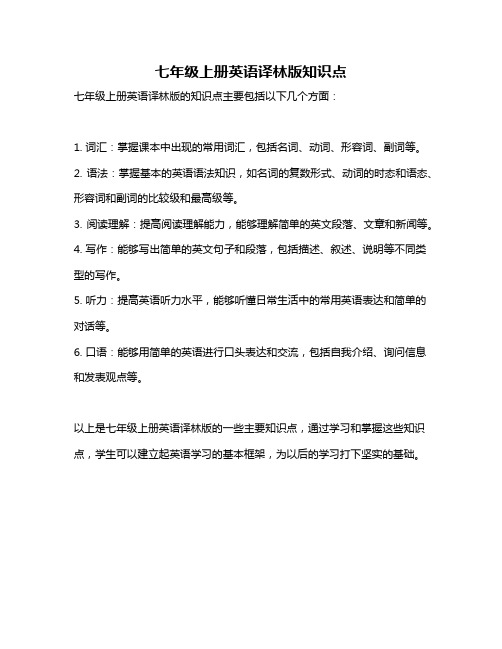
七年级上册英语译林版知识点
七年级上册英语译林版的知识点主要包括以下几个方面:
1. 词汇:掌握课本中出现的常用词汇,包括名词、动词、形容词、副词等。
2. 语法:掌握基本的英语语法知识,如名词的复数形式、动词的时态和语态、形容词和副词的比较级和最高级等。
3. 阅读理解:提高阅读理解能力,能够理解简单的英文段落、文章和新闻等。
4. 写作:能够写出简单的英文句子和段落,包括描述、叙述、说明等不同类型的写作。
5. 听力:提高英语听力水平,能够听懂日常生活中的常用英语表达和简单的对话等。
6. 口语:能够用简单的英语进行口头表达和交流,包括自我介绍、询问信息和发表观点等。
以上是七年级上册英语译林版的一些主要知识点,通过学习和掌握这些知识点,学生可以建立起英语学习的基本框架,为以后的学习打下坚实的基础。
- 1、下载文档前请自行甄别文档内容的完整性,平台不提供额外的编辑、内容补充、找答案等附加服务。
- 2、"仅部分预览"的文档,不可在线预览部分如存在完整性等问题,可反馈申请退款(可完整预览的文档不适用该条件!)。
- 3、如文档侵犯您的权益,请联系客服反馈,我们会尽快为您处理(人工客服工作时间:9:00-18:30)。
新译林版七年级(上册)英语全册知识点归纳总结一、词汇知识点整理:lookafter\takecareof照顾; 表示look 的短语:look after照顾 look at 看…; look for 寻找 look like 看起来像…onthefirstday在第一天 Class One, Grade Seven (先说班级,再说年级,且大写)。
playfootball踢足球 afterschool放学后be\comefrom来自 begoodat\dowellin擅长flykites放风筝gohome回家listentomusic听音乐 playagame玩游戏wearglasses戴眼镜 atschool在学校allthelessons所有的课程talkabout谈论overthere那里 alotofhobbies许多爱好二、结构用法:love\likedoingsth喜欢做某事let’s+动词原形让我们Iam\Mynameis我叫welcometo+地点欢迎来到 Thisis这是begoodat\dowellindoing擅长做inClass…Grade…在几年级几班be from = come from + 地点, 意思是“来自某地”。
He is from Nanjing、 P8 他来自南京。
livewith…in…和谁住在哪里live with sb 和某人住一起;live in+ 城市名,住在某地;live on the ground floor 住在一楼(用介词on)I’m…yearold、我几岁了。
year(s)old ,……岁,如果数词大于1, year 要用复数years、问年龄要用How old “几岁”提问。
例如:- is your sister?- She is11、应填How old、Ihave (short/long)hair、我留着短(长)头发三、句式用法What’syourname?你叫什么名字?Nicetomeetyou!很高兴见到你。
Ilovereading、我喜欢阅读英语、表示“喜欢”的用法:like喜欢 /love喜爱/enjoy喜欢 + V、-ing 形式。
Nowlet’smeetournewclassmates、现在让我们认识下我们的新同学。
Ioftenplayfootballafterschool、放学后我经常踢足球。
Sheistallandslim、她个头很高,身材苗条。
HeisfromNanjing、他来自南京。
He comes from Nanjing、HeisgoodatMaths、他擅长于数学。
He does well in Maths、Millieis11yearsold、米莉11岁。
Theyareallverynice、他们都很好。
Iamgoodatdancing、我擅长于跳舞。
四、语法归纳:连系动词be的一般现在时动词be的三变化amisare、我(I)用am,你(you)用are,is用于他(he)她(she)它(it),单数名词用is,复数名词都用are句型结构:1、肯定句:主语+am\is\are…Itisafootball、2、否定句:主语+am\is\are+not…Itisnotafootball、3、一般疑问句:Am\Is\Are+主语+其他?Isitafootball?回答Yes,itis、No,itisn’t4、特殊疑问句:疑问句+am/is/are+主语+其他?What’syourname? 语法小练习:用be动词的适当形式填空1、She___________mycousin、Hername__________LiJie、2、TomandI___________goodfriends3、What________thisinEnglish?It_________abook4、___________youJack?Yes,I__________5、What___________those?They_________hisnotebooks、Unittwo一、词汇知识点整理:playsports做运动 manytimesaday一天许多次playfootball/tennis踢足球/打网球 talkabout谈论afterschool放学后 goswimming去游泳amemberof…中的一员comefrom来自 listentomusic听音乐 inthenextWorldCup在下届世界杯cometrue实现inone’sfreetime在某人的空闲时间livein住/生活在 readbooks看书at/onweekends=at/ontheweekend在周末 stayathome待在家里alotof许多 asksbaboutsth问某人某事 onTV在电视上Watchbasketballmatches看篮球比赛 feelgreat感觉特棒二、结构用法:Whataboutdoingsth?做…怎么样?Enjoydoingsth喜欢做某事makesb/sth+adj使某人/某物makesbtodosth使某人做某事wanttodosth想要做某事hopetodosth希望做某事havefundoingsth做某事开心三、句式用法 Ilikewalking、我喜欢散步。
I enjoyswimming、What’syourfavouritesport?我喜欢游泳,他最喜欢的运动是什么?Ihopehisdreamcomestrue、我希望他梦想成真。
WhatdoesLiHuadoinhisfreetime?李华在业余时间做什么?Whatelsedoyouwanttodo?你还想做什么其他的事情?Readingisfun、读书是有趣的事情。
四、语法归纳:行为动词的一般现在时行为动词的一般现在时的构成:主语+行为动词+(其他)当主语为第三人称单数(he,she,it)时,谓语动词也要用单数形式。
用好一般现在时,时间状态需牢记;主语人称是三单,动词要把-s/-es添;基本用法要记清,状态习惯经常性。
行为动词的一般现在时的变化1、否定句:主语+don’t/doesn’t+动词原形+其他Idon’tlikebread、Hedoesn’toftenplayfootball、2、一般疑问句:Do/Does+主语+动词原形+其他Doyouoftenplayfootball?Yes,Iam/No,IamnotDoesheoftenplayfo otball?Yes,hedoes/No,hedoesn’t3、特殊疑问句:特殊疑问句+一般疑问句?Whendoyougotoschool?I gotoschoolatseveno’clock、动词的三单形式的变化:动词三单现在时,一般在词尾加SS,x,ch,sh,在词尾,直接加上-es词尾若是字母o,加上-es不用愁。
词尾是“辅音字母+y”,先变y为i,后边再加-es语法小练习:用括号内动词的适当形式填空。
1、Heoften________(have)dinnerathome、2、DanielandTommy_______(be)inClassOne、3、We_______(notwatch)TVonMonday、4、Nick_______(notgo)tothezooonSunday、5、______they________(like)theWorldCup?6、What_______theyoften_______(do)onSaturdays?7、_______yourparents_______(read)newspaperseveryday?8、Thegirl_______(teach)usEnglishonSundays、9、SheandI________(take)awalktogethereveryevening、10、There________(be)somewaterinthebottle、11、Mike_______(like)cooking、12、They_______(have)thesamehobby、13、Myaunt_______(look)afterherbabycarefully、14、Youalways_______(do)yourhomeworkwell、15、She_______(go)toschoolfromMondaytoFriday、16、Thechildoften_______(watch)TVintheevening、17、Howmanylessons_________yourclassmate_________(have)onMond ay?18、Whattime_________hismother_________(do)thehousework?Unit3一、词汇知识点整理:onfoot步行 farawayfrom远离 afew一些,少量 learnabout 学得,获知wouldlikesth/todosth想要/想要做某事afterclass 下课后 onthisday在今天allkindsof各种各样 onthephone在电话中lookat看 groundfloor底层,一楼onthewall在墙上 bybus 乘公共汽车infrontof在……前面 letmesee让我看看gotoschool去上学 readingroom阅览室borrowfrom从……借…… gettoschool到达学校ontheOpenDay在开放日二、结构用法:Thankyoufordoingsth为做某事而感谢你bereadytodosth准备做某事 Ittakessbsometimetodosth花费某人多少时间做某事showsbaround领某人参观needtodosth需要做某事三、句式用法:1、Which of the subjects do you like best, Eddie? P30 Eddie,(在所有科目中,你最喜欢哪一科?subjects 是复数。
= What’s your favourite subject ? 你最喜欢哪一科目?这个句型subject用单数。
subject 科目(9科):Chinese 语文Math数学 English英语 History历史 Biology生物Geography 地理Music 音乐Art美术 PE体育、2、- What’sthe date today ? P31 今天几号?(date, 日期,问日期)回答用- It’s9 October/ It’s October9、 (它是)月九日。
